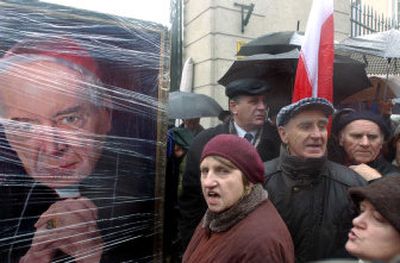Polish archbishop quits over secret police ties

WARSAW, Poland – Warsaw’s new archbishop abruptly resigned Sunday over revelations that he cooperated with Poland’s communist-era secret police, stunning worshippers by sadly yielding the archbishop’s throne just minutes before he was to be formally installed.
To cries of “No, no!” and “Stay with us!” in and outside St. John’s Cathedral, a despondent Stanislaw Wielgus read from a letter to Pope Benedict XVI in which he offered his resignation “after reflecting deeply and assessing my personal situation.”
The Vatican said Wielgus’ past actions had “gravely compromised his authority” as one of the top church officials in the deeply Roman Catholic homeland of late Pope John Paul II, adding that the 67-year-old priest was right to go “despite his humble and moving request for forgiveness.”
But his withdrawal sparked an uproar among those gathered in the cathedral and crowded outside, most of whom had not heard the Polish church’s announcement of the resignation a half-hour earlier. “They stoned the bishop!” an elderly woman outside shouted.
In a sign of how the painful revelations have divided believers, Wielgus’ words also drew applause from the congregation – including President Lech Kaczynski, whose conservative party has sought both to purge Poland of the vestiges of communist influence and to strengthen traditional Catholic values.
John Paul’s staunch opposition to communism is credited with inspiring the rise in the 1980s of Poland’s pro-democracy Solidarity movement, which helped end communist rule in 1989.
The disclosure is particularly troubling to many because it shakes a widely held belief that the church acted as a courageous opponent of communism.
While Sunday’s Mass was to have marked Wielgus’ official installation, he had been archbishop since taking his canonical vows for the post Friday. He previously was bishop of Plock, but it was not immediately clear what future role Wielgus might have with the church.
Allegations that Wielgus was involved with the secret police were first raised by a Polish weekly Dec. 20. But the case flared into a crisis Friday when a church historical commission said it had found evidence that Wielgus had cooperated with the communist authorities.
Wielgus initially denied the claims but later acknowledged he did sign an agreement in 1978 promising to cooperate with the security force in exchange for permission to leave Poland to study in West Germany.